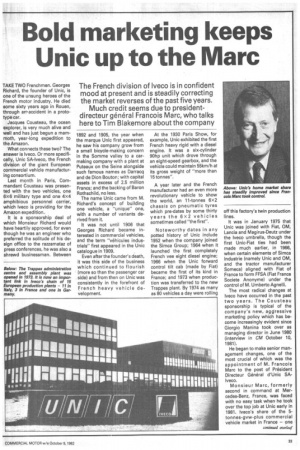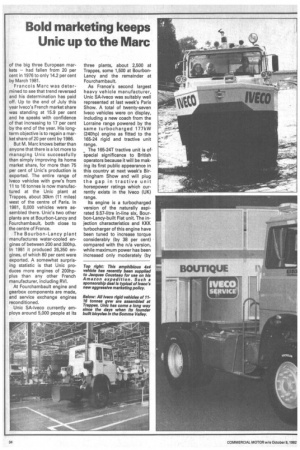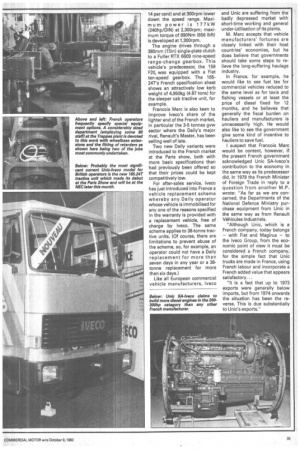Bold marketing keeps Unic up to the Marc
Page 25

Page 26

Page 27

If you've noticed an error in this article please click here to report it so we can fix it.
The French division of Iveco is in confident mood at present and is steadily correcting the market reverses of the past five years.
Much credit seems due to presidentdirecteur general Francois Marc, who talks here to Tim Blakemore about the company
TAKE TWO Frenchmen. Georges Richard, the founder of Unic, is one of the unsung heroes of the French motor industry. He died some sixty years ago in Rouen, through amaccident in a prototype car.
Jacques Cousteau, the ocean explorer, is very much alive and well and has just begun a mammoth, year-long expedition to the Amazon.
What connects these two? The answer is Iveco. Or more specifically, Unic SA-Iveco, the French division of the giant European commercial vehicle manufacturing consortium.
Last month in Paris, Commandant Cousteau was presented with the two vehicles, one 6x6 military type and one 4x4 amphibious personnel carrier, which Iveco is providing for the Amazon expedition.
It is a sponsorship deal of which Monsieur Richard would have heartily approved, for even though he was an engineer who preferred the solitude of his design office to the razzamataz of press conferences, he was also a shrewd businessman. Between 1892 and 1905, the year when the marque Unic first appeared, he saw his company grow from a small bicycle-making concern in the Somme valley to a carmaking company with a plant at Puteaux on the Seine alongside such famous names as Darracq and de Dion Bouton; with capital assets in excess of 2.5 million Francs; and the backing of Baron Rothschild, no less.
The name Unic came from M. Richard's concept of building one vehicle, a "unique" one, with a number of variants derived from it.
It was not until 1906 that Georges Richard became interested in commercial vehicles, and the term "vehicules industriels" first appeared in the Unic catalogue in 1909.
Even after the founder's death, it was this side of the business which continued to flourish (more so than the passenger car side) and from then on Unic was consistently in the forefront of French heavy vehicle development. At the 1930 Paris Show, for example, Unic exhibited the first French heavy rigid with a diesel engine. It was a six-cylinder 90hp unit which drove through an eight-speed gearbox, and the vehicle could maintain 55km/h at its gross weight of "more than 15 tonnes".
A year later and the French Manufacturer had an even more revolutionary vehicle to show the world, an 11-tonnes 6x2 chassis on pneumatic tyres which pre-dates by some thirty years the 6 x 2 vehicles sometimes called "the first".
Noteworthy dates in any potted history of Unic include 1952 when the company joined the Simca Group; 1964 when it launched the first completely French vee eight diesel engine; 1966 when the Unic forward control tilt cab (made by Fiat) became the first of its kind in France; and 1973 when production was transferred to the new Trappes plant. By 1974 as many as 80 vehicles a day were rolling off this factory's twin production lines.
It was in January 1975 that Unic was joined with Fiat, OM, Lancia and Magirus-Deutz under the Iveco umbrella, though the first Unic-Fiat ties had been made much earlier, in 1966, when certain elements of Simca Industrie (namely Unic and OM, and the tractor manufacturer Someca) aligned with Fiat of France to form FFSA (Fiat France Societe Anonyme) under the control of M. Umberto Agnelli.
The most radical changes at Iveco have occurred in the past two years. The Cousteau sponsorship is typical of the company's new, aggressive marketing policy which has be come increasingly evident since Giorgio Manina took over as managing director in June 1980 (interview in CM October 10, 1981).
He began to make senior management changes, one of the most crucial of which was the appointment of M. Francois Marc to the post of President Directeur General d'Unic SAIveco.
Monsieur Marc, formerly second in command at Mer cedes-Benz, France, was faced with no easy task when he took over the top job at Unic early in 1981. lveco's share of the 5tonnes-gvw-plus commercial vehicle market in France — one of the big three European markets — had fallen from 20 per cent in 1976 to only 14.2 per cent by March 1981.
Francois Marc was determined to see that trend reversed and his determination has paid off. Up to the end of July this year lveco's French market share was standing at 15.9 per cent and he speaks with confidence of that increasing to 17 per cent by the end of the year. His longterm objective is to regain a market share of 20 per cent by 1986.
But M. Marc knows better than anyone that there is a lot more to managing Unic successfully than simply improving its home market share, for more than 75 per cent of Unic's production is exported. The entire range of lveco vehicles with gvw's from 11 to 16 tonnes is now manufactured at the Unic plant at Trappes, about 30km (11 miles) west of the centre of Paris. In 1981, 8,000 vehicles were assembled there. Unic's two other plants are at Bourbon-Lancy and Fourchambault, both close to the centre of France.
The Bourbon-Lancy plant manufactures water-cooled engines of between 200 and 300hp. In 1981 it produced 26,350 engines, of which 80 per cent were exported. A somewhat surprising statistic is that Unic produces more engines of 200hpplus than any other French manufacturer, including RV!.
At Fourchambault engine and gearbox components are made, and service exchange engines reconditioned.
Unic SA-Iveco currently employs around 5,000 people at its three plants, about 2,500 at Trappes, some 1,500 at BourbonLancy and the remainder at Fourchambault.
As France's second largest heavy vehicle manufacturer, Unic SA-Iveco was suitably well represented at last week's Paris Show. A total of twenty-seven lveco vehicles were on display, including a new coach from the Lorraine range powered by the same turbocharged 17 7kW (240hp) engine as fitted to the 165-24 rigid and tractive unit range.
The 165-24T tractive unit is of special significance to British operators because it will be making its first public appearance in this country at next week's Birmingham Show and will plug the gap in tractive unit horsepower ratings which currently exists in the lveco (UK) range.
Its engine is a turbocharged version of the naturally aspirated 9.57-litre in-line six, Bourbon-Lancy-built Fiat unit. The Injection characteristics and KKK turbocharger of this engine have been tuned to increase torque considerably (by 38 per cent) compared with the n/a version, while maximum power has been increased only moderately (by 14 per cent) and at 300rpm lower down the speed range. Maximum power is 1 7 7 kW (240hp/DIN) at 2,300rpm; maximum torque of 890Nm (656 Ibft) is developed at 1,300rpm.
The engine drives through a 380mm (15in) single-plate clutch to a Fuller RTX 6609 nine-speed range-change gearbox, This vehicle's predecessor, the 159 F20, was equipped with a Fiat ten-speed gearbox. The 16524T's French specification sheet shows an attractively low kerb weight of 4,950kg {4.87 tons} for the sleeper cab tractive unit, for example.
Francois Marc is also keen to improve Iveco's share of the lighter end of the French market, in particular the 3-5 tonnes gvw sector where the Daily's major rival, Renault's Master, has been selling well of late.
Two new Daily variants were introduced to the French market at the Paris show, both with more basic specifications than had previously been offered so that their prices could be kept competitively low.
For after-sales service, Iveco has just introduced into France a vehicle replacement scheme whereby any Daily operator whose vehicle is immobilised for any one of the reasons specified in the warranty is provided with a replacement vehicle, free of charge by Iveco. The same scheme applies to 38-tonne tractive units, {Of course, there are limitations to prevent abuse of the scheme, so, for example, an operator could not have a Daily replacement for more than seven days in any year or a 38tonne replacement for more than six days.) Like all European commercial vehicle manufacturers, Iveco and Unic are suffering from the badly depressed market with short-time working and general under-utilisation of its plants.
M. Marc accepts that vehicle manufacturers' fortunes are closely linked with their host countries' economies, but he does believe that governments should take some steps to relieve the long-suffering haulage industry.
In France, for example, he would like to see fuel tax for commercial vehicles reduced to the same level as for taxis and fishing vessels or at least the price of diesel fixed for 12 months, and he believes that generally the fiscal burden on hauliers and manufacturers is unnecessarily high. He would also like to see the government give some kind of incentive to hauliers to save fuel.
I suspect that Francois Marc would be content, however, if the present French government acknowledged Unic SA-Iveco's contribution to the economy in the same way as its predecessor did. In 1979 the French Minister of Foreign Trade in reply to a question from another M.P. wrote: "As far as we are concerned, the Departments of the National Defence Ministry purchase equipment from Unic in the same way as from Renault Vehicules Industriels.
"Although Unic, which is a French company, today belongs — with Fiat and Magirus — to the Ivaco Group, from the economic point of view it must be considered a French company, for the simple fact that Unic trucks are made in France, using French labour and incorporate a French added value that appears satisfactory...
"It is a fact that up to 1973 exports were generally below imports, but from 1974 onwards the situation has been the reverse. This is due substantially to Unic's exports."
































































